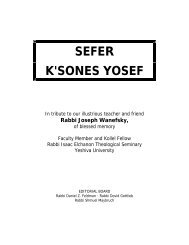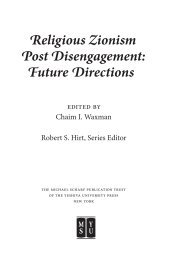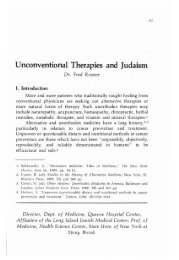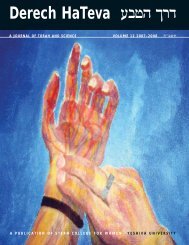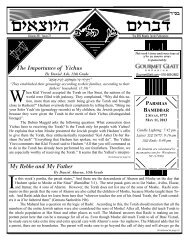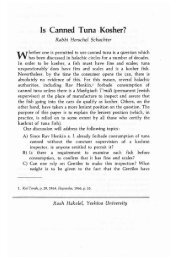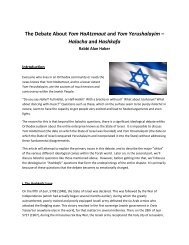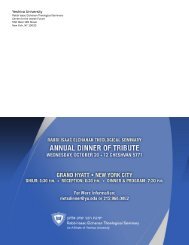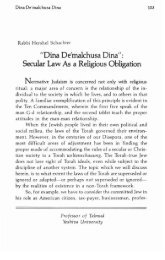yeshiva university • purim to-go • adar 5771 - YU Torah Online
yeshiva university • purim to-go • adar 5771 - YU Torah Online
yeshiva university • purim to-go • adar 5771 - YU Torah Online
- No tags were found...
You also want an ePaper? Increase the reach of your titles
YUMPU automatically turns print PDFs into web optimized ePapers that Google loves.
assimilationist philosophy <strong>to</strong> the grave. All this confirms that Purim is more of a “bot<strong>to</strong>m-up”holiday, as opposed <strong>to</strong> Chanukah, which is more “<strong>to</strong>p-down.”How does this thesis relate <strong>to</strong> our observation that Purim was established on the day of rest? Inrecognition of klal yisrael’s active role in establishing the holiday, we continue <strong>to</strong> observe Purimin much the same way. We continue <strong>to</strong> observe the day of rest because that is what we have beendoing since the very beginning. In this way we grant recognition <strong>to</strong> klal yisrael’s unique role inestablishing Purim.We are now in position <strong>to</strong> understand a number of other phenomenon as well. According <strong>to</strong> oneprominent view (Rabbenu Tam quoted in Rosh Megilla 1:1 and Ran 1b be’Alfas) we observe Ta’anitEsther on the thirteenth of Adar <strong>to</strong> simulate the emotions of the Jews immediately before departingfor the battlefield. Once again we mark the role played by the Jews of that generation: just as theyfasted and prayed before engaging the enemy, so <strong>to</strong>o we fast and pray before reading the Megilla.Perhaps we can now offer a novel resolution <strong>to</strong> another problem. Purim is unique among theJewish holidays in that two dates have been set aside for the holiday – the fourteenth andfifteenth. Why does Purim break so sharply from general Yom Tov pro<strong>to</strong>col? In light of the abovethe answer is clear: we continue <strong>to</strong> observe Purim in this unusual fashion simply because that’swhat the Jews did in that inaugural year.We can also now explain a curious position among the rishonim. Tosafot (Megilla 4a s.v. psak)maintains that we do not recite the prayer of al hanissim during Shmoneh Esrei of Maarivbecause we have not yet read the Megilla. This is quite an unusual suggestion, and seems <strong>to</strong> besui generis among the other yamim <strong>to</strong>vim of the year. Did anyone ever propose omitting al hanissimon the first night of Chanukah? Or leaving out ya’aleh ve-yavo on the first night of theShalosh Regalim? 40 How are we <strong>to</strong> understand Tosafot’s seemingly radical position? Perhaps wecan explain that our observance of Purim is modeled after that of our forefathers: We do notcelebrate Purim by reciting al hanissim until we first “take the initiative” by reading the Megillaand offering thanks <strong>to</strong> Hashem. Just as the original Purim was incomplete without the activeparticipation of the Jews, so <strong>to</strong>o our Purim is incomplete without our first reliving the miracleand offering praise and thanks <strong>to</strong> the Almighty.Purim – and its unusual placement on the day of rest – thus highlights two crucial themes. First,as much as we hate the sin we nevertheless love the sinner, for all humans are created in theimage of God. This principle dictates not only the details of the holidays but their timing as well.Second, we must not only passively accept Hashem’s commands but <strong>to</strong> be proactive in seekin<strong>go</strong>ut religious opportunities. Let us not merely try <strong>to</strong> “keep up” with our religious responsibilities;instead we must identify ways in which we can take new steps <strong>to</strong> enrich our religious lives. Bydoing so we will follow the path blazed by our ances<strong>to</strong>rs: " ", “theyaccepted that which they had already begun <strong>to</strong> perform.”וקבל עליהם את אשר החלו לעשות40The halacha that one who omits ya’aleh ve-yavo at night need not repeat Shmoneh Esrei (Berachot 30b, ShulchanAruch Orach Chaim 422:1) is not germane <strong>to</strong> our discussion. First, no one suggests that even lechatchila one neednot recite ya’aleh ve-yavo at night, only that one need not repeat Shmoneh Esrei for this omission. Second, that is aunique halacha based on the fact that Beit Din did not sanctify the new moon at night, and is therefore notconnected <strong>to</strong> our discussion.42YESHIVA UNIVERSITY <strong>•</strong> PURIM TO-GO <strong>•</strong> ADAR <strong>5771</strong>



